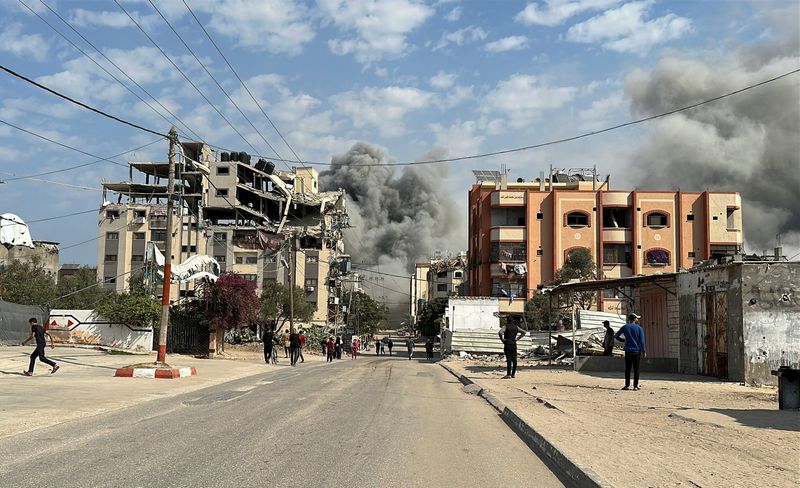By Nidal al-Mughrabi, Timour Azhari and Laila Bassam
CAIRO/BEIRUT (Reuters) -Prospects of a ceasefire between Israel and its foes Hamas and Hezbollah ran aground on Friday as Israeli airstrikes killed at least 68 people in the Gaza Strip, according to medics in the Palestinian enclave, and bombed Beirut's southern suburbs.
The Israeli military said it killed senior Hamas official Izz al-Din Kassab in an airstrike in the southern Gaza town of Khan Younis and described him as one of the last surviving high-ranking members of Hamas responsible for coordinating with other groups in Gaza.
U.S. envoys had been working to secure ceasefires on both fronts ahead of the U.S. presidential election next Tuesday.
But Hamas does not favour a temporary truce, its Al-Aqsa Hamas television reported on Friday. The ceasefire proposals failed to meet its conditions that any deal must end the year-long war in Gaza and include a withdrawal of Israeli forces from the devastated Palestinian enclave, it said.
Earlier, Israeli Prime Minister Benjamin Netanyahu said his priority was to enforce security "despite any pressure or constraints".
His office said he relayed this message to U.S. envoys Amos Hochstein and Brett McGurk in Israel on Thursday. Israel meanwhile pressed on with its military offensives against Hamas in Gaza and Hezbollah in Lebanon on Friday.
Medics in Gaza said about 68 people were killed and dozens injured overnight and into Friday morning in Israeli strikes on the city of Deir Al-Balah, the Nuseirat camp and the town of Al-Zawayda, all in Gaza's central area, as well as in its south.
Fourteen people were killed by an Israeli strike at the gate of a school sheltering displaced Palestinians in Nuseirat, according to medics at the camp's Al-Awda Hospital. Another 10 were killed in a car in Khan Younis, medics said.
Hours later, residents said Israeli tanks advanced on the northern and eastern sides of Nuseirat, and medics said an Israeli airstrike killed four people, including three children.
The Israeli military said its troops killed what it called armed terrorists in central Gaza and the northern Jabalia area. It had no immediate comment on the reported school strike, although it habitually denies deliberately attacking civilians.
The heads of U.N. humanitarian agencies said on Friday the situation in north Gaza was "apocalyptic" with the entire Palestinian population there at "imminent risk of dying from disease, famine and violence" as Israel pursues its offensive against regrouping Hamas militants in the area.
Israel also pummelled Beirut's southern suburbs on Friday morning with at least 10 strikes, Reuters journalists said. It was the first bombardment of the area - once a densely packed district and Hezbollah stronghold - in nearly a week.
The strikes came after Israel issued evacuation orders for 10 separate neighbourhoods of the Lebanese capital.
Hassan Saad, speaking on a Beirut street, told Reuters: "This is a brutal war and Israel does not have the right to do this...There must be a limit put for Israel because it does not abide by any of the laws or human morality."
Another Beirut man, Ali Ramadan, said he believed the Israeli airstrikes were a way to put pressure on Lebanon in the ceasefire negotiations.
The hostilities have undermined hope a truce could be reached before the U.S. presidential election on Tuesday.
Hamas television, quoting a leading source in the group, said the ceasefire proposals did not meet its conditions for a permanent end to hostilities, withdrawal of Israeli troops from Gaza and the return of displaced people.
Nor did they address Palestinians' need for security, relief and reconstruction and the full reopening of border crossings, the source said.
U.S. Secretary of State Antony Blinken and Israeli Minister of Strategic Affairs Ron Dermer on Friday discussed a diplomatic solution to the conflict in Lebanon as well as ending the war and addressing dire humanitarian conditions in Gaza, the State Department said in a statement.
'ISRAELI STUBBORNNESS'
Lebanon's caretaker Prime Minister Najib Mikati on Friday accused Israel of blocking any progress in the negotiations.
"Israeli statements and diplomatic signals received by Lebanon confirm the Israeli stubbornness in rejecting the proposed solutions and insisting on the approach of killing and destruction," he said.
Lebanon's health ministry said 52 people were killed on Friday in Israeli strikes on more than a dozen towns in the Baalbek region, which has UNESCO-listed Roman ruins.
An Israeli strike on Friday in Syria near northeast Lebanon forced a border crossing to shut, Lebanon Transport Minister Ali Hamieh told Reuters. Israeli bombing closed the crossing last month and it had partly reopened before the latest strike.

Hezbollah began firing rockets at Israel in solidarity with Palestinians a day after Hamas-led militants attacked Israel on Oct. 7, 2023, killing some 1,200 people and taking 251 hostages back to Gaza, according to Israeli tallies.
Israel's retaliatory offensives have killed more than 43,000 Palestinians and reduced most of Gaza to rubble, as well as killed at least 2,897 people in Lebanon, its health ministry said in an update on Friday.